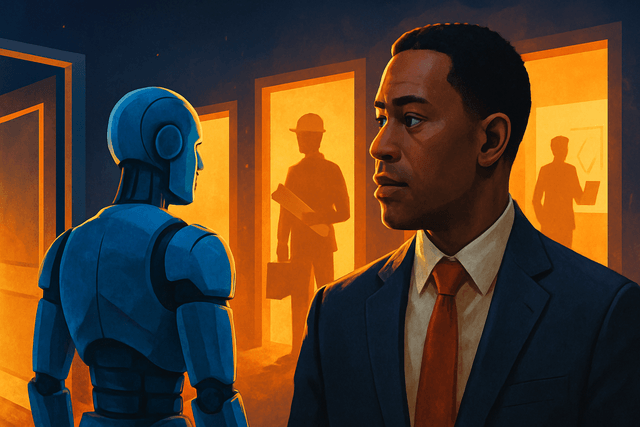AI job displacement isn't a future threat—it's today's reality. The timeline isn't someday; it's this quarter. Companies aren't planning; they're executing. The survival choice is becoming binary: master AI or become irrelevant.
According to the World Economic Forum's 2025 Future of Jobs Report, 41% of employers worldwide intend to reduce their workforce in the next five years due to AI automation. But they're not waiting five years—the transformation is happening now.
Companies aren't just cutting costs anymore; they're replacing entire job functions with software. The data is particularly concerning for new graduates. Research from SignalFire shows Big Tech companies reduced new graduate hiring by 25% in 2024 compared to 2023. These aren't just hiring slowdowns—these are positions that no longer exist.
Bloomberg research reveals AI could replace 53% of market research analyst tasks and 67% of sales representative tasks, while managerial roles face only 9 to 21% automation risk. Anthropic CEO Dario Amodei predicts AI could eliminate half of all entry-level white-collar jobs within five years.
Perhaps the most widespread impact of AI won't be complete job displacement or creation, but the transformation of existing roles. By 2025, an estimated 60% of all jobs will see at least 30% of their tasks automated or augmented by Artificial Intelligence. A study by McKinsey Global Institute estimates that as early as 2030, AI could contribute to the creation of 20 million to 50 million new jobs globally across healthcare, technology, finance, and more. As AI technology evolves, new roles and skill sets are emerging, demanding a proactive approach to upskilling. Occupations that require a blend of technical expertise and uniquely human skills, such as creativity, critical thinking, and emotional intelligence, are expected to witness significant growth. AI-related roles like AI specialists, data scientists, machine learning engineers, and robotics engineers are becoming increasingly essential in various industries.
With generative AI displacing millions of entry-level white-collar jobs, new roles are emerging across diverse sectors. These roles demand advanced skills, often requiring reskilling in data literacy, systems thinking, and critical reasoning. AI job creation will happen faster than most think and is already taking off in 2025. AI-related job titles reflect increasing specialization beyond machine learning engineers. Emerging roles such as Generative AI Engineer, Computer Vision Engineer, and Remote AI Training Specialist highlight the niche areas where AI talent is most in demand. These positions reflect the growing complexity of AI systems, where expertise is becoming increasingly specialized and segmented. The breadth and depth of AI-related job growth show that it's no longer confined to tech firms or generalist roles—it's a universal force reshaping the global workforce.
According to research with global organizations, by 2025, 54% of employees will require significant reskilling, the half-life of professional skills will shrink from 5 years to 2.5 years, and professionals who combine domain expertise with AI literacy will command 35% higher salaries. For organizations, this means investing heavily in workforce development and creating learning ecosystems. For professionals, continuous skill development becomes not just advantageous but essential for career longevity. Beyond changing individual jobs, AI is driving fundamental shifts in how work is organized, managed, and executed. By 2025, we'll see new workplace structures emerging with AI systems handling data processing, pattern recognition, and routine decisions, while human workers provide judgment, creativity, and interpersonal skills.
Generative AI can transform the future of jobs through human-machine collaboration. According to the World Economic Forum, human-centered skills remain critical, even in our rapidly evolving, tech-driven workplaces. This finding highlights an urgent need to make reskilling and upskilling permanent strategies to bridge emerging skill gaps. Employers must prioritize these strategies to help workers transition into roles that combine technical expertise with essential human-centric abilities. By investing in adaptable talent development, businesses can create a workforce equipped for the challenges of tomorrow. In the latest findings, 50% of the workforce had completed training as part of learning and development programs, a notable improvement from 41% in 2023. This upward trend is prevalent across nearly every industry, underlining the growing recognition of continuous skill development as critical to every industry.

